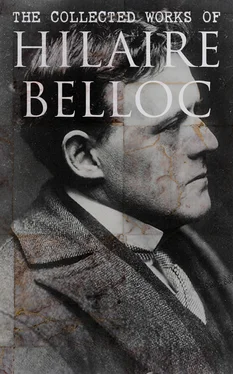Undoubtedly a very great part in the moulding of his character proceeded from his experience in the United States of America. He was then at the most impressionable and formative period of human life, little more than a boy, or at least just entering early manhood. He had just married, he had just come into the administration of his vast fortune. At such a moment he took part in the victorious rebellion of the English colonies, and it may be imagined how powerful was the effect of this youthful vision upon the whole of the man's future life; because there was no proletariat in the colonies, he never saw or comprehended the dispossessed classes of Paris—for that matter he never saw or comprehended the French peasantry upon his own lands; because a chance and volunteer soldiery had, under the peculiar conditions of the half-populated Atlantic seaboard in conjunction with the French fleet and with the aid of French money and arms, got the better of the small and heterogeneous forces of George III, he believed that a military nation like the French, in the midst of powerful enemies, could make something of an amateur civic force; because a certain type of ease in social relations was the ideal of many, perhaps of most, of those with whom he had served in America, he confused so simple and mundane an ideal with the fierce crusading blast and the sacred passion for equality which was stirring his own nation when his opportunity for leadership came.
It may be said of La Fayette with justice that he never upon a single occasion did the right thing. It may also be said with justice that he never did politically any major thing for which his own conscience would later reproach him. It is noticeable that the Queen held him in particular odium. He had been a wealthy young noble about the Court, the friend of all her women friends, and his sympathy with the revolutionary movement at its inception therefore seemed to her nothing better than treason. There was also undoubtedly something in his manner which grievously repelled her; that it was self-sufficient we cannot doubt, and that it was often futile and therefore exasperating to women, events are sufficient to show. But Marie Antoinette's violent personal antagonism towards La Fayette was not common, though several ardent spirits (Danton's, for instance) shared it. The mass of those who came across La Fayette felt in connection with him a certain irritation or a certain contempt or a certain rather small and distant respect; he inspired no enthusiasms, and when he timidly attempted a rebellion against the new Government after the fall of the monarchy, no one would sacrifice himself or follow him.
It may be affirmed of La Fayette that if he had not existed the Revolution would have pursued much the same course as it did, with this exception: that there would not have been formed a definitely middle class armed guard to provoke friction in Paris: the National Guard would have been more open to all ranks.
In religion the man was anodyne, Catholic of course by baptism, but distinctly Protestant in morals and in general tone, in dogma (until the end of his life) freethinking, of course, like all his contemporaries. He was personally courageous but foolishly despised the duel. One anecdote out of many will help to fix his nature in the mind of the reader. Mirabeau, casting about as usual for aid in his indebtedness, sent urgently to him as to a fellow noble, a fellow politician and a fellow supporter of the Crown, begging a loan of £2000. La Fayette accorded him £1000.
Dumouriez presents a character particularly difficult for the modern Englishman to comprehend, so remote is it in circumstance and fundamentals from those of our time.
Of good birth, but born in a generation when social differences had become a jest for intelligent and active men (and he was intelligent and active), courageous, with a good knowledge of his trade of soldiering, of rapid decision and excellent judgment where troops or terrain were concerned, he was all at sea in the comprehension of men, and he bore no loyalty to the State.
It is this last feature which will particularly surprise the English reader, for it is the singular and permanent advantage of oligarchic communities such as the British that they retain under any stress and show throughout the whole commonwealth the sense of the State. To betray the State, to act against its interests, to be imperfectly conscious of its existence, are crimes or weaknesses unknown to the citizens of an oligarchy, and a citizen of this country cannot easily conceive of them to-day. In democracies and despotisms, on the other hand, to forget one's duty to the State, to be almost oblivious of its corporate existence, is a common weakness. There is here a compensation, and by just so much as despotism and democracy permit rapid, effective and all-compelling action on the part of the State, by just so much as they permit sudden and sometimes miraculous enthusiasms which save or which confirm a State, by that also do they lack the quiet and persistent consciousness of the State which oligarchy fosters and determines.
Dumouriez' excellence as a general can only be appreciated by those who have looked closely into the constitution of the forces which he was to command and the adversaries with whom he had to deal. It is the prime quality of a great commander that his mind stands ready for any change in circumstances or in the material to his hand, and even when we have allowed for the element of luck which is so considerable in military affairs, we must not forget that Dumouriez saved without disaster the wretched and disorganised bands, inchoate and largely mutinous as to their old units, worthless and amateur as to their new, which had to meet, in and behind the Argonne, the model army of Prussia.
We must not forget that his plan for the invasion of the Low Countries was a just and sensible one, nor with what skill, after the inevitable defeat and retreat of the spring of 1793, he saved his command intact.
As a subordinate to an armed executive, to the Government of Napoleon, for instance, the man would have been priceless. Nay, had circumstances permitted him to retain supreme command of civil as of military power, he would have made no bad dictator. His mere technical skill was so considerable as to make the large sums paid him by the English Government seem a good bargain even at our distance of time, and his plans for the defence of England and for the attack on Napoleon are a proof of the value at which he was estimated.
But Dumouriez was quite unable to act under the special circumstances in which he happened to be placed at the moment of his treason. A mere ambition had carried him from intrigue to intrigue among the politicians. He despised them as an active and capable soldier was compelled to despise them; he was too old to share any of their enthusiasms, even had his temperament permitted him to entertain any vision, political or religious. He certainly never felt the least moral bond attaching him to what was in his eyes the chance anarchy of the last six months of French Government under which he served, and if he is to be branded with the title of traitor, then we must brand with the same title all that multitude of varied men who escaped from the country in the Emigration, who left it in disgust, or even who remained in France, but despaired of French fortunes, in the turmoil of 1793.
It is perhaps a worthy excuse for Dumouriez' failure to point out that he also was one of those whom the Court might have used had it known how to use men; but the Court had no such knowledge.
The character of Danton has more widely impressed the world than that of any other revolutionary leader, because it contained elements permanently human, independent of the democratic theory of the time, and necessary neither to the support of that theory nor to the criticism of it.
Читать дальше












